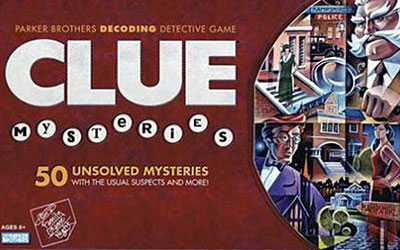Clue Mysteries
Decode and record clues found with detective toolkit that contains spyglass, secret mirror, and location key
 Return to the scene of the crime with this detective board game update, featuring six new suspects. Investigate fifty unique mysteries using a detective toolkit that features a spyglass, secret mirror, and decoding key. Decode secret clues from witnesses. Record clues in notebook. Discover the right clues, make your arrest and justice will prevail.
Return to the scene of the crime with this detective board game update, featuring six new suspects. Investigate fifty unique mysteries using a detective toolkit that features a spyglass, secret mirror, and decoding key. Decode secret clues from witnesses. Record clues in notebook. Discover the right clues, make your arrest and justice will prevail.
Children's fascination with detective games is rooted in their natural curiosity, problem-solving skills, and the appeal of mystery-solving activities. Engaging in detective games provides them with opportunities to explore, think critically, and engage their imagination. Here are several reasons why children enjoy detective games:
- Natural Curiosity: Children are naturally curious and love to explore the world around them. Detective games tap into this curiosity by presenting them with mysteries to solve and secrets to uncover, satisfying their desire to understand and discover.
- Intellectual Challenge: Detective games require players to use their critical thinking and analytical skills to gather clues, connect dots, and solve puzzles. The challenge of piecing together information and solving a mystery provides a sense of accomplishment and mental stimulation.
- Empowerment: Detective games often cast players as clever problem-solvers who can unravel complex situations. Children enjoy the feeling of being in control and having the ability to solve challenging problems, which boosts their self-esteem and confidence.
- Engaging Storytelling: Detective games typically come with intriguing narratives that draw players into the world of the mystery. Immersive storytelling captures children's attention and encourages them to actively participate in the plot's progression.
- Observational Skills: Detectives must pay close attention to details in their surroundings. Detective games encourage children to develop and hone their observational skills, teaching them to notice subtle clues and patterns in their environment.
- Social Interaction: Many detective games are designed for group play, encouraging collaboration and teamwork. Working together to solve a mystery fosters communication, cooperation, and problem-solving skills while promoting positive social interactions.
- Thrill of Discovery: The process of uncovering hidden information, cracking codes, and revealing secrets creates a sense of excitement and anticipation. Children enjoy the thrill of discovery that comes with solving mysteries step by step.
- Use of Props and Tools: Detective games often involve using tools such as magnifying glasses, notebooks, and maps. The use of these props enhances the imaginative experience and allows children to immerse themselves fully in the role of a detective.
- Emulation of Heroes: Many fictional characters, from Sherlock Holmes to Nancy Drew, are revered for their detective skills. Children are drawn to the idea of becoming their own heroes by emulating these intelligent and resourceful characters.
Children enjoy detective games because they satisfy their innate curiosity, challenge their intellect, empower them to solve problems, and provide an exciting and immersive experience. Detective games promote critical thinking, observation, and collaboration while allowing children to explore the thrill of mystery-solving in a fun and engaging way.
